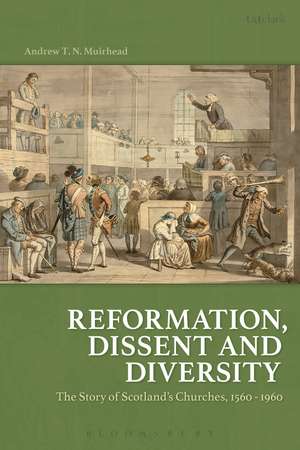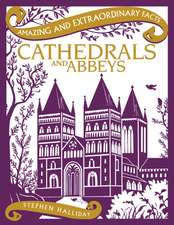Reformation, Dissent and Diversity: The Story of Scotland's Churches, 1560 - 1960
Autor Andrew T.N. Muirheaden Limba Engleză Paperback – 25 feb 2015
| Toate formatele și edițiile | Preț | Express |
|---|---|---|
| Paperback (1) | 218.00 lei 6-8 săpt. | |
| Bloomsbury Publishing – 25 feb 2015 | 218.00 lei 6-8 săpt. | |
| Hardback (1) | 509.72 lei 6-8 săpt. | |
| Bloomsbury Publishing – 25 feb 2015 | 509.72 lei 6-8 săpt. |
Preț: 218.00 lei
Preț vechi: 244.94 lei
-11% Nou
Puncte Express: 327
Preț estimativ în valută:
41.71€ • 45.45$ • 35.15£
41.71€ • 45.45$ • 35.15£
Carte tipărită la comandă
Livrare economică 23 aprilie-07 mai
Preluare comenzi: 021 569.72.76
Specificații
ISBN-13: 9781441139030
ISBN-10: 1441139036
Pagini: 256
Ilustrații: black & white illustrations
Dimensiuni: 156 x 234 x 14 mm
Greutate: 0.36 kg
Editura: Bloomsbury Publishing
Colecția T&T Clark
Locul publicării:London, United Kingdom
ISBN-10: 1441139036
Pagini: 256
Ilustrații: black & white illustrations
Dimensiuni: 156 x 234 x 14 mm
Greutate: 0.36 kg
Editura: Bloomsbury Publishing
Colecția T&T Clark
Locul publicării:London, United Kingdom
Caracteristici
Helps the reader to understand denominational differences, and the implications for local communities.
Notă biografică
Andrew Muirhead is a former librarian interested in the churches' impact on the life of Scotland. He traces his own family through several of the denominations described here and is President of the Scottish Church History Society.
Cuprins
Contents AcknowledgementsIntroduction Chapter 1 Overview: 1560-1688: Reformation to Revolution Chapter 2 Dissenting voices backing Bishops: Roman Catholics and Episcopalians Chapter 3 Overview: 1688-1843: After the Revolution Chapter 4 Dissenting voices The Covenanting and Secession traditions Chapter 5 Governing lives: The churches' impact on personal life. Chapter 6 Non-Presbyterian Dissent: the major lines. Chapter 7 Overview: 1843-1900: Disruption to Diversity Chapter 8 Dissenting voices: The Disruption tradition Chapter 9 Imports and other small churches Chapter 10 Non Trinitarian Churches Chapter 11 The geography of faith in Scotland Chapter 12 Overview: 1900-1960: The 20th century church Tables and Maps Further reading Index
Recenzii
Brilliantly presented history of Scotland's many sects and secessions.
This is a 'quiet' book that deserves a loud welcome. Andrew Muirhead has managed to pack four hundred years of the story of Scotland's churches into a couple of hundred pages of informative, accessible and concise writing. ... He has certainly fulfilled his modest aim of assisting the family and local historian and the book will equally be a boon for students and anyone wanting a short, clear guide to the subject. This volume deserves loud cheers for introducing such clarity to the story of Scotland's churches.
'Tradition is passing on a flame not worshipping the ashes.' This opening quote strikes the tone of this very welcome study of four turbulent centuries where Scotland's churches have played a pivotal role in shaping Scotland's history, development and the lives of its citizens . I strongly commend this book to anyone who has a love for the churches in Scotland and an enthusiasm for expanding knowledge and understanding.
Andrew Muirhead has written a splendidly clear and readable one-volume account of Scotland's churches, for which we are all in his debt.
Muirhead's attention to detail is fastidious throughout the volume, culminating in a series of maps and charts that give quick overviews of various denominations and their geographical spread throughout Scotland and trace the genetic flow of those churches. . [A] useful resource.
This splendid account is the Baedeker for anyone trying to find their way through the complexities of Scottish Church History since the Reformation. Muirhead balances the big picture with the local. He reminds us of the shakers and movers in the history of the Scottish church but also of the everyday supporters and their concerns. He recognises the role played by religion in individual lives but also the way that piety could be warped into peculiarity. This is the best kind of church history: clear narrative, cogent analysis and relevant anecdote.
This is an excellent and incisive treatment of the history of Christianity in Scotland over a four hundred year period since the Scottish Reformation.
The bewildering variety of Christian denominations past and present can confuse the historical researcher and the contemporary observer alike. Alistair Muirhead, however, reveals the origin and development of virtually every Christian body that has existed in Scotland since the Reformation, providing a concise and accessible introduction to the history of the faith in Scotland over four centuries.
Modestly, Muirhead says that this is a 'non-academic outline of why Scotland has so many churches, Presbyterian and otherwise.' In reality, however, it is a tour de force which will reward the reader with insights into the politics and the theology of every aspect of Scottish Church history from the Reformation to the Disruption and on into the 20th Century reunion of the Churches. The historical cameos bring the text to life and there are surprising revelations which put some of our present day controversies into perspective. I heartily commend this book to anyone who wants to understand the present day Church in Scotland.
This is the first research-based ecclesiastical history of post-Reformation Scotland in a generation. From John Knox to Billy Graham, Andrew Muirhead casts his gifted eye over the whole realm of religious change, bringing up to date our understanding of how the country moved in four centuries from a Presbyterian theocracy to a multi-faith democracy. This is an authoritative narrative of the Christian churches, using extensive archival quotation and learned assessment. The book has many claims to originality, not least being the author's command of Scotland's often-neglected ecclesiastical law, and the due attention paid to the important forms of dissent which Scots not merely adopted but in many cases invented. Rich in insight and vivid description, the author provides a readable textbook for student and general reader alike.
This is a 'quiet' book that deserves a loud welcome. Andrew Muirhead has managed to pack four hundred years of the story of Scotland's churches into a couple of hundred pages of informative, accessible and concise writing. ... He has certainly fulfilled his modest aim of assisting the family and local historian and the book will equally be a boon for students and anyone wanting a short, clear guide to the subject. This volume deserves loud cheers for introducing such clarity to the story of Scotland's churches.
'Tradition is passing on a flame not worshipping the ashes.' This opening quote strikes the tone of this very welcome study of four turbulent centuries where Scotland's churches have played a pivotal role in shaping Scotland's history, development and the lives of its citizens . I strongly commend this book to anyone who has a love for the churches in Scotland and an enthusiasm for expanding knowledge and understanding.
Andrew Muirhead has written a splendidly clear and readable one-volume account of Scotland's churches, for which we are all in his debt.
Muirhead's attention to detail is fastidious throughout the volume, culminating in a series of maps and charts that give quick overviews of various denominations and their geographical spread throughout Scotland and trace the genetic flow of those churches. . [A] useful resource.
This splendid account is the Baedeker for anyone trying to find their way through the complexities of Scottish Church History since the Reformation. Muirhead balances the big picture with the local. He reminds us of the shakers and movers in the history of the Scottish church but also of the everyday supporters and their concerns. He recognises the role played by religion in individual lives but also the way that piety could be warped into peculiarity. This is the best kind of church history: clear narrative, cogent analysis and relevant anecdote.
This is an excellent and incisive treatment of the history of Christianity in Scotland over a four hundred year period since the Scottish Reformation.
The bewildering variety of Christian denominations past and present can confuse the historical researcher and the contemporary observer alike. Alistair Muirhead, however, reveals the origin and development of virtually every Christian body that has existed in Scotland since the Reformation, providing a concise and accessible introduction to the history of the faith in Scotland over four centuries.
Modestly, Muirhead says that this is a 'non-academic outline of why Scotland has so many churches, Presbyterian and otherwise.' In reality, however, it is a tour de force which will reward the reader with insights into the politics and the theology of every aspect of Scottish Church history from the Reformation to the Disruption and on into the 20th Century reunion of the Churches. The historical cameos bring the text to life and there are surprising revelations which put some of our present day controversies into perspective. I heartily commend this book to anyone who wants to understand the present day Church in Scotland.
This is the first research-based ecclesiastical history of post-Reformation Scotland in a generation. From John Knox to Billy Graham, Andrew Muirhead casts his gifted eye over the whole realm of religious change, bringing up to date our understanding of how the country moved in four centuries from a Presbyterian theocracy to a multi-faith democracy. This is an authoritative narrative of the Christian churches, using extensive archival quotation and learned assessment. The book has many claims to originality, not least being the author's command of Scotland's often-neglected ecclesiastical law, and the due attention paid to the important forms of dissent which Scots not merely adopted but in many cases invented. Rich in insight and vivid description, the author provides a readable textbook for student and general reader alike.












